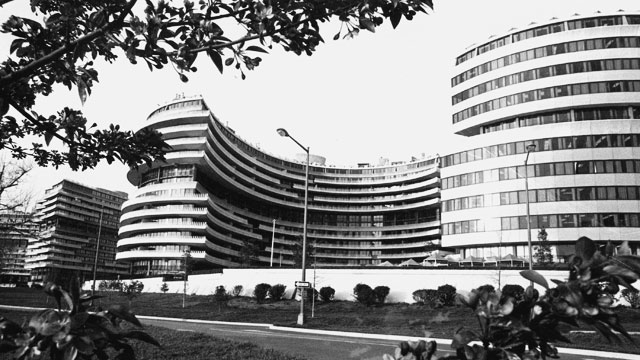Those of us who cut our journalism teeth covering Richard Nixon and the Watergate scandal(s) were caught up in a wave of nostalgia this week as our colleagues at ProPublica reported that a new super PAC has registered with the Federal Election Commission (FEC) — called CREEP, the Committee for the Re-Election of the President.
CREEP was what everyone called Nixon’s 1972 fundraising committee, despite their futile efforts to make us act like grown-ups and use its official acronym, CRP, or simply, “the Committee to Re-Elect.” But CREEP was just too irresistible, especially given the perpetual, political cartoon stereotype of Nixon as a hunched-over, skulking stalker with five o’clock shadow, and the ever-mounting real evidence of break-ins, bag men and other assorted dirty tricks.
The new CREEP is based out of a post office box at the Watergate office, apartment and shopping complex, “an inside joke with a serious punchline,” ProPublica’s Kim Barker writes. “The old CREEP… helped spur the creation of the FEC. The website for CREEP Super PAC says it’s committed ‘to raising voices not dollars’ and advocates disclosure. From the ProPublica article:
“It’s an excellent chance for people to step back and say, “Are we happy with 40 years of campaign finance and the lack of disclosure?”’ said Robert Lucas, 22, founder of the new CREEP and a graduate student in public policy at Georgetown University. ‘There’s a lot of irony, with the 40th anniversary of Watergate and where we are now.”
Where we are now, thanks to the Supreme Court’s Citizens United and other decisions, is 324 Super PACs registered with the FEC, of which only half or so actually have raised or spent money. But the ones that have are living large. According to the Center for Responsive Politics, so far, super PACs aligned with presidential candidates have spent a whopping $80,773,876, and The New York Times notes, “The big money in presidential politics is about to get a whole lot bigger.”
The Romney campaign is setting a goal of $600 million; President Obama’s campaign expects to reach or exceed the $750 million raised in 2008. And those figures don’t count the hundreds of millions expected from Super PACs and others.
“This is going to be the most moneyed election in the history of the United States,” said Bob Edgar, the president of Common Cause, a group that favors greater restrictions on campaign spending. Mr. Edgar, a former congressman who was among the Democratic ’Watergate babies’ elected in the wake of the scandal, added, ‘There is a sense of coming full circle, of forgetting our history — the reason we installed a system for financing campaigns that didn’t rely on corporate or wealthy money.”
In the words of the notorious Deep Throat, the Watergate crisis supposedly taught us to “follow the money.” But in a post-Citizens United world, unlimited and anonymous contributions plus other fundraising dodges make tracing campaign cash harder than ever.
Arizona Senator John McCain was co-sponsor of the McCain-Feingold campaign finance reform act that was partly scuttled by the court decisions. Recently, he attacked Citizens United and warned “I promise you, there will be huge scandals because there’s too much money washing around, too much of it we don’t know who’s behind it and too much corruption associated with that kind of money. There will be major scandals.”
Stay tuned.


